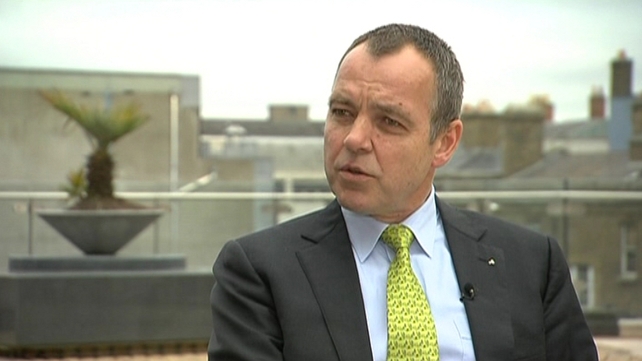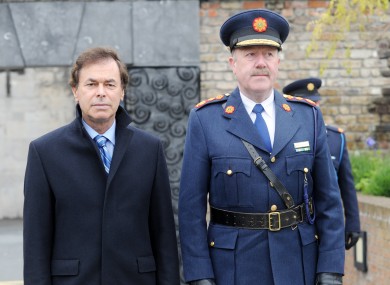Alan Dukes confirms the IBRC ex (Anglo Irish Bank) board ‘has been liquidated’
The board of the Irish Bank Resolution Corporation, formerly known as Anglo Irish Bank, has been stood down.
The functions of the board will now be carried out by accountancy group KPMG.
The Government is expected to introduce emergency legislation this evening to liquidate the failed Anglo Irish Bank.
The Government chief whip Paul Kehoe said the Dáil will reconvene at 11pm tonight to discuss emergency legislation to give effect to the liquidation. Earlier, a private members motion brought by Independent TDs on the promissory note was debated.
President Michael D Higgins flew back from Rome, where he was on an official visit, to be in Dublin to sign the legislation into law.
Mr Kehoe told the Dáil the Minister for Finance had taken action to secure the stability of the former Anglo Irish Bank.
He said the European Central Bank (ECB) was considering an Irish government proposal to resolve discussions on the promissory note.
He said the leaking of some elements of the ongoing discussion was unfortunate in relation to extend the terms of the debt for Irish Bank Resolution Corporation (IBRC), formerly Anglo Irish bank.
The chief whip added that the Minister for Finance had taken action to secure the stability of IBRC in the face of these leaks.
There had been considerable confusion in Leinster House tonight about whether a deal would be agreed with the ECB on extending the term of the €31 billion debt for the former Anglo Irish Bank.
He confirmed the Dáil would debate the IBRC Resolution Bill 2013, in a debate starting at 11pm and expected to conclude shortly before 1am. It will then go immediately to the Seanad.
Mr Kehoe spoke during a private members motion from independent TDs on the promissory note. They called on the Government not to pay the €3.1 billion due in March.
Fine Gael backbencher Peter Mathews criticised the appointment of KMPG as liquidators of IBRC and said there was no moral or legal obligation on Ireland to pay the banks debt.
He pointed out that the firm was the auditor for Irish Nationwide, which lost €6 billion on a balance sheet of only €10 or €11 billion.
Independent TD Catherine Murphy said she was offended as a public representative that the Government had not trusted TDs with some information on its plans when it was being widely reported in the media.
At the end of the private members motion there was a series of votes with the Government defeating the motion, before the House was suspended until 10.30 pm.
IBRC chairman Alan Dukes confirmed earlier this evening that “the board is liquidated as of now, the functions of the board are being taken over by KPMG.”
KMPG’s Padraic Monaghan has been given responsibility for running IBRC’s board, but has not been appointed liquidator. Staff at IBRC were informed of KPMG’s appointment by email this evening. A liquidator is expected to be appointed imminently.
Central Bank governor Patrick Honohan, who sits on the ECB’s Governing Council, has put a revised plan to his fellow central bank governors at a meeting in Frankfurt but no decision has emerged as yet.
However, there is expectation in Dublin that a formula acceptable to all sides is now within grasp. Under the plan Mr Honohan has presented, the IBRC – which was set up to manage the winddown of Anglo Irish and Irish Nationwide – will be liquidated so that the Government no longer has to make annual interest payments of over €3 billion on the €31 billion promissory note used to bail out Anglo.
If Ireland gets ECB sign-off for the plan, most of IBRC’s balance sheet will pass to the Central Bank, as it enforces collateral used by IBRC to secure more than €40 billion of Central Bank funding, the source said.
Those assets will include a long-term Irish government bond which will be used to replace the current promissory note. A longer-term bond will mean that Ireland can make the payments more gradually. These bonds will be held by the Central Bank.
Ireland initially wanted the Central Bank to hold that instrument for a minimum of fifteen years. The ECB’s governing council warned that such a long holding period would effectively be “monetary financing”, which is prohibited by article 123 of the EU treaty.
It is understood that the 15-year clause is now being dropped. IBRC’s remaining loans will be transferred to Nama, which will pay for them with Nama bonds, the source familiar with the discussions said. A spokesman for Nama declined to comment.
Ireland is desperate to avoid having to pay a politically incendiary €3.1 billion a year until 2023 to service the notes issued to underwrite Anglo and has been in talks for some 18 months.
Fianna Fáil finance spokesman Michael McGrath said if speculation is correct and the Government is to strike a deal, its success would be measured by the impact on the general public.
“People will want to see a difference in their pockets,” Mr McGrath said.
“They will want to see a difference on the high street. They will want to see a difference in the retail sector.”
He added: “The question is how will this impact on the budget? I believe, and I’ve said this a number of times, a good deal could have a very tangible impact on the next budget.
“The Government is looking to take €3.1 billion out of the economy next year. A good deal would reduce that very substantially.”
President MD Higgins unexpectedly returns to Dublin for new legislation


President Michael D. Higgins unexpectedly returned home to Dublin tonight from Rome where he had just completed day one of a three day visit to mark the Irish Presidency of the EU.
President Michael D. Higgins unexpectedly returned home to Dublin tonight from Rome where he had just completed day one of a three day visit to mark the Irish Presidency of the EU.
A spokesman for the President said that he had returned home at short notice because of the “possibility of there being legislation to consider”.
The spokesman confirmed the legislation in question concerns the government’s plan to liquidate the IRBC bank, formerly Anglo-Irish. The President is expected to return to Rome tomorrow in time to attend a reception this evening held in his honour by Italian President Giorgio Napolitano.
On Friday, President Higgins is due to visit the UN’s Food and Agriculture Organisation (FAO) in Rome, whilst he returns to Ireland on Saturday. His change of schedule today means that he will forgo a visit to the Pontifical Irish College in Rome.
Aer Lingus operating profits increase by 40.7% for 2012 as did its passenger numbers


Aer Lingus clocked up record passenger numbers in 2012 and Aer Lingus chief Christoph Mueller says the Ryanair-Flybe deal will not fly
Aer Lingus said that it’s full year revenues for 2012 increased by 8.2% to €1.393 billion from €1.288 billion.
Operating profits before exceptional items jumped 40.7% to €69.1m from €49.1m.
But pre-tax profits for the year to the end of December fell by 51.9% to €40.6m from €84.4m.
Aer Lingus said this is because in 2011 the airline made “exceptional gains” after it surrendered the lease of its headquarters at Dublin Airport to the DAA.
In 2012 it recorded “exceptional costs” including restructuring its Shannon aircraft maintenance operations, and legal costs associated with the Ryanair takeover bid.
The airline said it carried a total of 10.8 million passengers during the year – the highest number flown in a single year by the group.
The figure included passengers on its regional operations and the Washingon-Dulles-Madrid codeshare with United Airlines. Its load factor rose by 2.1 points to 77.7%.
See how Aer Lingus shares are doing in Dublin.
The board is recommending an increased dividend of four cent per share, which follows a three cent per share dividend paid in 2011.
The company said that its Greenfield restructuring programme was completed during the year, which exceeded the annualised savings target by 7.4%.
”I firmly believe that this result, representing our third consecutive year of profitability, validates our value carrier business model and shows that our strategy is delivering a leaner, more efficient and profitable carrier, to the benefit of customers, shareholders and staff,” commented the airline’s chief executive Christoph Mueller.
He said that the airline will remain focused on creating demonstrable value for its shareholders in 2013.
”After the successful delivery of the Greenfield restructuring programme for 2012, resolving the complex pension legacy and further efficiency improvements across the organisation will drive the management agenda in 2013,” he added.
Aer Lingus said its fuel costs represented 27% of total operating costs last year, up from the level of 23.3% in 2011. It blamed the increase on ”adverse movements’ in price and currency factors.
The airline said that 2012 saw challenging macroeconomic conditions and weak underlying demand in some of the key markets in which it operates. However, it added that the airline is confident it will once again outperform the Ireland and UK market this year.
Speaking on RTÉ’s Morning Ireland, the Aer Lingus chief executive said he believes Ryanair’s latest bid for the company will be unsuccessful.
Mr Mueller also dismissed the announcement by FlyBe this morning that it would create FlyBe Ireland in the event of a takeover of Aer Lingus by Ryanair. He said the proposal was “not going to fly”.
On the pensions deficit at the airline, Aer Lingus said it was ”disappointed” that the attempts to find a solution to the problem facing it have not yet been successful. The deficit is estimated to be some €779m on the minimum standard basis.
Minister Alan Shatter planning to recruit more Gardaí


Justice Minister Alan Shatter has today signalled that he may be about to recruit gardaí for the first time since 2009.
The numbers of Gardaí retiring is larger than expected and no garda has graduated since April 2011.
Minister Shatter said that he does not want the force to fall below 13,000, which could now happen before the end of this year.
He said that he plans to bring proposals to Government within weeks.
“I am reviewing the position regarding Garda numbers in light of an estimated reduction to just over 13,000 by the end of 2013,” he said.
“In this context, I’ll be bringing proposals to Cabinet in the coming weeks.
“I’ll be making these proposals as part of a wider determination to ensure that the Garda Síochána has the greatest possible resources available to it.”
Sperm counts lower watching TV as well as not enough physical activity
GREATER EXERCISE IS CONSISTENT WITH IMPROVED SPERM COUNTS, STUDY SUGGESTS
Evidence suggests moderate exercise could change men’s physiology to improve testicular health, an expert says.
Young men who get more exercise and watch less TV have higher sperm counts than those with less healthy habits, a study suggests.
Men who exercised for 15 or more hours weekly at a “moderate to vigorous” rate had a 73-per cent higher sperm concentration than those who exercised less than five hours per week. Participants were divided into four groups based on their physical activity levels.
The findings come after decades of research in several Western countries into whether declines in sperm quality from men going to fertility clinics indicate widespread drops in the general population of healthy men or are just blips.
“In this population of healthy men, higher moderate-to-vigorous activity and less TV watching were significantly associated with higher total sperm count,” said Jorge Chavarro, assistant professor of nutrition and epidemiology at the Harvard School of Public Health.
“Our findings suggest that a more physically active lifestyle may improve semen quality.”
To explore the questions involved, Harvard researchers tested sperm samples from 189 men aged 18 to 22 and asked them questions about their physical activity levels, diet and TV viewing.
Chavarro and his co-authors published their results in Tuesday’s online issue of the British Journal of Sports Medicine.
None of the participants had sperm counts that would be a cause for alarm, said Warren Foster, a professor in the department of obstetrics and gynecology at McMaster University in Hamilton, who was asked about the results.
“One of the things that we know is that when you engage in moderate to strenuous exercise on a regular basis, serum testosterone increases,” Foster said in an interview with CBC News.
“Serum testosterone … is involved in sperm production. As a consequence of that, one would expect to see that the more fit you are that you would potentially see a modest increase in semen quality.”
Scientists suspect that regular physical activity may prevent against oxidative stress damage and protect sperm from damage.
EVERYTHING IN MODERATION
Higher scrotal temperatures have also been proposed as an explanation, but whether that is a consequence or cause of impaired sperm production is unclear, Chavarro’s team said.
The researchers acknowledged that study was limited by the relatively small number of volunteers who provided only a single sperm sample.
Dr. Allan Pacey, senior lecturer in andrology at the University of Sheffield, noted that other research suggests that too much physical activity may harm sperm production.
Chavarro’s study did not look at the type and intensity of physical activity.
“My advice would be everything in moderation — and that includes time in the gym as well as watching TV (or perhaps both at the same time!),” Pacey told the Australian Broadcasting Corporation.
Nearest Earth-like planet ‘in our own cosmic back yard’ says Astronomers
The nearest Earthlike planets could be just 13 light-years away, putting them in our cosmic “back yard”, astronomers have claimed.
Six per cent of red dwarfs, the most common stars in our galaxy, have Earth-sized planets which could be habitable, according to data from Nasa’s Kepler space telescope.
On this basis, experts from the Harvard-Smithsonian Centre for Astrophysics calculated that the closest Earthlike world is probably as close as 13 light-years to Earth.
Courtney Dressing, a graduate student who led the study, said: “We thought we would have to search vast distances to find an Earthlike planet. Now we realise another Earth is probably in our own backyard, waiting to be spotted.”
Red dwarfs, which are smaller and cooler than our Sun, are not visible from Earth with the naked eye but make up 75 per cent of the stars in our galaxy, numbering about 75 billion.
The researchers identified all the red dwarfs in a sample of 158,000 stars catalogued by Kepler and calculated their size and temperature, discovering that most were smaller and cooler than previously thought.
They identified 95 candidate planets orbiting these stars, and found that three were both warm and about the same size as Earth. The results will be published in The Astrophysical Journal.
Overall the researchers calculated that about six per cent of all red dwarfs should have an Earth-sized planet, meaning they could estimate the likely distance to the nearest one.
This means finding life beyond the solar system should be “significantly easier” than previously thought, co-author David Charbonneau said.
Because such worlds would be closer to their parent stars than Earth is to the Sun, they would most likely be tidally locked and rely on a thick atmosphere or deep ocean to transmit heat around the planet, researchers said.
Red dwarfs live much longer than Sun-like stars, they added, meaning any life on the planets could be much older and more evolved than life on Earth.





No comments:
Post a Comment